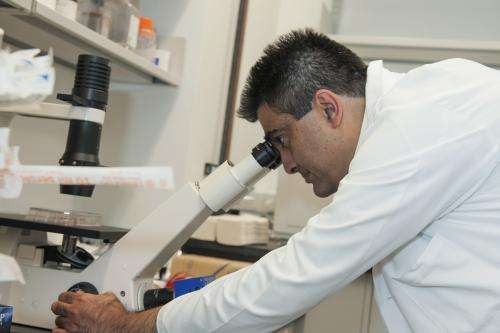Adult stem cells help build human blood vessels in engineered tissues

(Medical Xpress)—Researchers at the University of Illinois at Chicago have identified a protein expressed by human bone marrow stem cells that guides and stimulates the formation of blood vessels.
Their findings, which could help improve the vascularization of engineered tissues, were reported online Oct. 12 in the Journal of Molecular and Cellular Cardiology.
"Some stem cells actually have multiple jobs," says Dr. Jalees Rehman, associate professor of cardiology and pharmacology at the UIC College of Medicine and lead author of the paper. For example, stem cells in the bone marrow, he said, differentiate into bone or cartilage, but also have a secondary role in helping to support other cells in the bone marrow.
Rehman and his colleagues, who are developing engineered tissues for use in cardiac patients, observed that certain stem cells in bone marrow, called mesenchymal stem cells, seemed crucial for organizing other cells into functional blood vessels.
The researchers demonstrated that when they mixed mesenchymal stem cells from human bone marrow with the endothelial cells that line blood vessels, the stem cells elongated to form scaffolds and the endothelial cells organized around them to form tubes.
"But without the stem cells, the endothelial cells just sat there," said Rehman.
When the cell mixtures were implanted into mice, blood vessels formed that were able to support the flow of blood. To find out how the stem cells were helping promote blood vessel formation, the researchers looked at which genes were being expressed when the stem cells and endothelial cells were combined.
They tested two different stem cell lines from human bone marrow. One line supported the formation of blood vessel networks when it was mixed with endothelial cells, while the other cell line did not.
They analyzed the genetic signature and proteins of the respective cell lines and found that the vessel-supporting stem cell line released high levels of a blood vessel guidance molecule – SLIT3. In the mixture that didn't form blood vessels, the SLIT3 gene was hardly expressed, Rehman said.
"This means that not all stem cells are created alike in terms of their SLIT3 production and their ability to encourage blood vessel formation," Rehman said. "While using a patient's own stem cells for making blood vessels is ideal because it eliminates the problem of immune rejection, it might be a good idea to test a patient's stem cells first to make sure they are good producers of SLIT3. If they aren't, the engineered vessels may not thrive, or even fail to grow."
Mesenchymal stem cell injections are currently being evaluated in clinical trials to see if they can help grow blood vessels and improve heart function in patients who have suffered heart attacks. So far, the benefits of stem cell injection have been modest, Rehman said.
"Evaluating the gene and protein signatures of stem cells from each patient may allow for a more individualized approach, so that every patient receives mesenchymal stem cells that are most likely to promote blood vessel growth and cardiac repair. Hopefully, this will substantially increase the efficacy of stem cell treatments for heart patients."
















